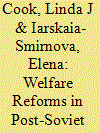| Srl | Item |
| 1 |
ID:
183977


|
|
|
|
|
| Summary/Abstract |
The development of regulatory frameworks has accelerated in Russia after the ratification of the UN Convention on the Rights of Persons with Disabilities in 2012. Using public opinion poll data and interviews with school administrators, teachers, assistants and parents, the authors show the challenges of moving towards inclusive education in contemporary Russia. The development of an inclusive school culture is analysed at the levels of artefacts, values and assumptions. Attempts to forge an inclusive culture do not always go smoothly; unexpected consequences occur, including open and hidden resistance and conflicts between children, parents and teachers. Meanwhile, the external context threatens the sustainability of inclusion.
|
|
|
|
|
|
|
|
|
|
|
|
|
|
|
|
| 2 |
ID:
190462


|
|
|
|
|
| Summary/Abstract |
In recent years, the Russian government has adopted major social policy reforms that incorporate contemporary state-of-the-art international principles and practices. New legislation has mandated deinstitutionalisation, that is, closing Russia’s large network of residential facilities for children ‘without parental supervision’ (‘deti bez popecheniya roditelei’)Footnote1 and people with disabilities. Programmes of foster care and adoption are emptying orphanages, while efforts have been made to reorient efforts of social workers and family courts towards preserving families. Children with disabilities are being moved out of institutions and integrated into public schools, while adults now have possibilities to live and work in communities that have been made more accessible. ‘Active Ageing’ policies are designed to enhance the agency and self-determination of older people. Schools have begun to integrate the children of migrant workers. Some social service provision has been outsourced to socially-oriented non-governmental organisations (SONPOs; see Cook et al. Citation2021) in order to allow a choice of providers and services. While the progress of these reforms has been uneven, collectively they reflect the Russian government’s efforts towards integrating into mainstream society groups that have for decades been marginalised or institutionalised.
|
|
|
|
|
|
|
|
|
|
|
|
|
|
|
|